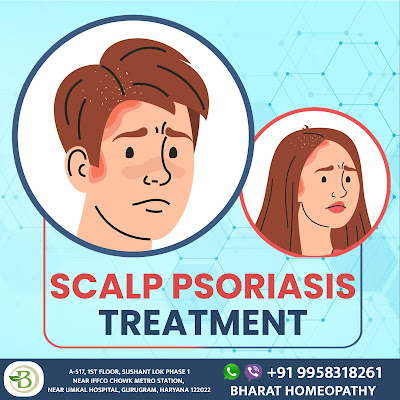Scalp psoriasis symptoms can be characterised by small plaques that completely cover the scalp or small, fine scales that resemble the appearance of dandruff. Psoriasis may appear similar to other skin conditions like seborrheic dermatitis. However, seborrheic skin dermatitis is greasy and yellow, whereas scalp psoriasis has an ethereal shine and appears like it is powdery. People of colour typically have scalp psoriasis. However, due to their hair and hair colour, it can be difficult to treat.
Psoriasis that affects the scalp is also known as scalp psoriasis. It is common, and around 50% of people with Psoriasis also have it on their scalps. Even children can develop scalp psoriasis. Treatments will be similar to those for adults. Due to the fact that this can become more challenging to treat and often requires special treatments, scalp psoriasis requires the attention of a specialist.
A common skin condition known as scalp psoriasis can result in reddish, raised patches of scaly skin on the scalp. Other areas that may be affected are the face, region behind the ear, and the neck's back. Medical experts say that the disorder occurs when the skin cells increase in size. While the exact cause of scalp psoriasis is not known, it is generally thought to be a result of the immune system that promotes the rapid growth of skin cells. The risk of developing this disorder is greater in those with an ancestral scalp psoriasis experience.
While scalp psoriasis is usually mild and barely evident but it can develop into a serious condition that can result in itching and blisters that are thick. Skin infection and loss of hair can result from scratching and picking at the areas of scaly skin. The stress caused by this skin problem can result in temporary loss of hair due to the fact that some treatments for scalp psoriasis can be difficult for the skin.
Psoriasis is a chronic non-infectious autoimmune disorder that is characterised by uneven, raised skin patches. These patches are dry, scaly, itchy and red or pink-purple in colour. The severity of the disease can vary from tiny isolated spots to the whole body. Many people believe that it is an illness that genetic and environmental influences cause.
The following are some of the most common psoriasis causes.
If one twin suffers from it, the other twin has a threefold likelihood of getting it when they are identical compared to the case if they are not. This suggests that the disease is predisposed to genetic factors.
Certain drugs and the colder weather can cause more symptoms.
Psychological stress and mental health issues can contribute to stress and psychological conditions.
The immune system's reaction against the skin cell is the most fundamental step. The psoriasis symptoms are frequently used to establish an assessment. The thick, scaly plaques created by this inflammation may cause discomfort or itching. The reason for this is that skin cells expand rapidly and cause overgrowths.
There are various symptoms of the disease. They differ according to the appearance of the scales and the location they are in the body. A large proportion of Indians suffer from one form or another of this illness. Psoriasis-related symptoms typically increase in response to environmental triggers. While there is currently no cure for these conditions, there are recent advances in psoriasis treatment This implies that it is possible to reduce the frequency and severity of flare-ups.
Homoeopathic treatment for psoriasis performs by strengthening immunity instead of decreasing it. It eradicates the underlying source of the problem and stops it from recurring. Anti-inflammatory medications, pharmaceuticals and immunosuppressive treatment are known to temporarily alleviate the signs of disease without giving a permanent cure but are not found in homoeopathic treatments. They can also cause harm to vital organs such as the liver, joints heart, kidney, and joints. Homoeopathic treatments are vital if you are seeking a way to treat psoriasis in the long term.




No comments:
Post a Comment